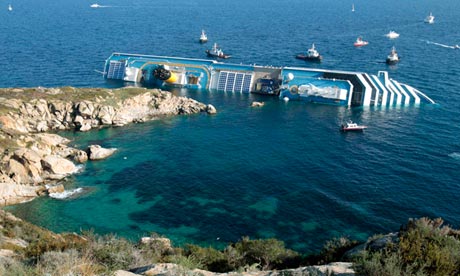Italian court sentences cruise liner employees for manslaughter and negligence over sinking of cruise liner off Giglio

The Costa Concordia cruise liner lies on its side after running aground off the Italian island of Giglio.
An Italian court has convicted five people of manslaughter and negligence over the shipwreck of the Costa Concordia cruise liner that left 32 people dead.
The court in the Tuscan town of Grosseto accepted plea bargains for the Costa Cruises employees on Saturday, handing the harshest sentence to the company's crisis co-ordinator, Roberto Ferranini, who will serve two years and 10 months in jail.
The ship's hotel director was sentenced to two years and six months while two bridge officers and a helmsman got sentences ranging from 20 to 23 months. None are likely to go to jail as sentences under two years are suspended, and the longer sentences may be appealed or replaced with community service, judicial sources said.
The plea bargains were handled separately from the trial of the Costa Concordia captain, Francesco Schettino, who is charged with manslaughter for causing the shipwreck in January 2012 off the Tuscan island of Giglio and for abandoning the vessel with thousands on board. If found guilty, he faces up to 20 years in prison.
Daniele Bocciolini, a lawyer for the victims, said of Saturday's sentencing: "What will the families of the victims think? This is truly disappointing.
"Schettino remains the only one on trial, but not the only one at fault, in my opinion," he told SkyTG24.
On Wednesday, Schettino's lawyers offered to accept a sentence of three years and five months in return for a guilty plea. A previous offer to serve three years and four months was rejected in May. Hearings resume in September.
Prosecutors allege that Schettino lost control of the 114,500-tonne ship after hitting a rock as he skirted the shoreline of Giglio in a "salute" to a retired cruise line commodore. Schettino has denied the charges and insisted that the rock was not on nautical maps.
The reef sliced a 70-metre-long (230ft) gash in the hull and seawater rushed in, causing the ship to capsize.
Survivors described an evacuation that was so confused and delayed that by the time it got under way, lifeboats on one side of the Concordia could no longer be launched because the vessel was listing too far.
A list of victims read out in the court began with a Frenchman, Francis Servel, who "not having found a place on the lifeboat, threw himself into the sea without a life vest", the court official read. He was "sucked toward the bottom of the whirlpool produced by the final flipping over on the right side of the ship, and then died due to asphyxiation".
Shortly after the tragedy, survivors recounted how Servel had given his wife his life vest because she didn't know how to swim, the court heard.
The bodies of victims No 31 and 32 were never found, but after a long, futile search of the ship's interior and the nearby waters they were declared dead. One of them was a middle-aged Italian passenger, Maria Grazia Trecarichi, who, with no place on a lifeboat and while waiting to be rescued wearing a life vest, "slid off into the sea because of the progressive tilt of the boat" and presumably drowned, the court official said.
No 32 was a Filipino waiter, Russel Terence Rebello. The court heard how the crewman "remained on the ship to carry out the lowering of the last lifeboats" and either fell or dived into the sea because of the Concordia's dramatic tilt, and was presumed to have drowned.
Other victims drowned on board as violently swirling water rose up inside the ship. The court heard how some passengers were "sucked into a vortex" of water rushing into the Concordia when it capsized. This happened after the crew told them to go to the other side of the ship where lifeboats were being launched, and the passengers ended up trying to walk down a tilting corridor.
Post a Comment